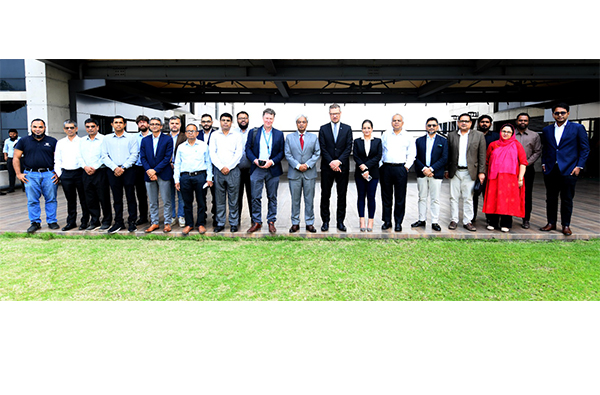


April 29, 2025
BGMEA hosts strategic dialogue on effective circular business model in Bangladesh
A ‘Strategic Dialogue on Establishing an Effective Circular Business Model in Bangladesh’ was held in BGMEA Complex, Dhaka on 29th April, 2025. The event brought together key stakeholders from the apparel industry, development partners, and sustainability experts to discuss about the project’s activities, potential business model, and chart the path forward.
The event was organized as part of the BESTSELLER Switch to Upstream Circularity (SWITCH2CE) Pilot. The project is led by the United Nations Industrial Development Organization (UNIDO), in collaboration with the Bangladesh Garment Manufacturers and Exporters Association (BGMEA), BESTSELLER, Global Fashion Agenda (GFA), Reverse Resources, Chatham House, Circle Economy, and the European Investment Bank. The project aims to steer Bangladesh’s transition toward a circular economy through policy, innovation, and collaboration.
Discussions during the roundtable highlighted the crucial need to build capacity, improve infrastructure for Jhut waste management and digital platform, traceability, and support workers engaged in the recycling sector. Participants emphasized the importance of developing scalable business models that ensure traceability, digital platform for transparency, regulatory compliance, and higher recycling efficiency.
BGMEA Administrator Md. Anwar Hossain, in his welcome remarks, emphasized the need to develop a robust business model that can facilitate Bangladesh’s transition to circularity. He underscored that without a viable economic model, sustainable transformation would remain limited in scale and impact.
Mark Draeck, Chief Technical Adviser at UNIDO, extended his gratitude to BGMEA, the European Union, and all project partners. He shared his thoughts on the steady progress made under the project and reiterated UNIDO’s commitment to supporting green industrial growth through innovation and collaboration.
Vidiya Amrit Khan, Adviser of BGMEA Standing Committee on Circular Economy, reflected on the project’s journey, emphasizing the importance of traceability as a cornerstone for building a circular value chain.
Shamiul Hoque of Global Fashion Agenda presented an overview of the project’s progress, offering valuable insights into the pilot's development and the practical challenges being addressed through joint action.
BGMEA Support Committee members Inamul Haq Khan Bablu, Rezwan Selim, and Shams Mahmud also spoke at the event. They shared perspectives on the ground realities of the textile sector and why integrating circularity is not only essential for future competitiveness but also a strategic move to align with evolving international sustainability standards.
Representing the lead brand partner in the pilot, BESTSELLER reiterated the company’s strong commitment to enabling circular systems and emphasized that circularity is not just a trend, it is the future of doing business. Through this pilot, BESTSELLER wants to demonstrate that it is possible to build scalable and inclusive circular value chains in sourcing countries like Bangladesh.
The BESTSELLER Switch to Upstream Circularity (SWITCH2CE) pilot is part of the global UNIDO-led SWITCH to Circular Economy Value Chains project (SWITCH2CE), co-funded by the European Union and the Government of Finland. The project works with EU multinational companies and their suppliers from developing countries to switch to more circular economy approaches and practices in three selected value chains: Plastic Packaging, Textile&Garments, and ICT&Electronics.

Copyright © 2020, The Bangladesh Garment Manufacturers and Exporters Association.
Version-2.0, Design & Developed by Systech Digital Limited.
Version-2.0, Design & Developed by Systech Digital Limited.
